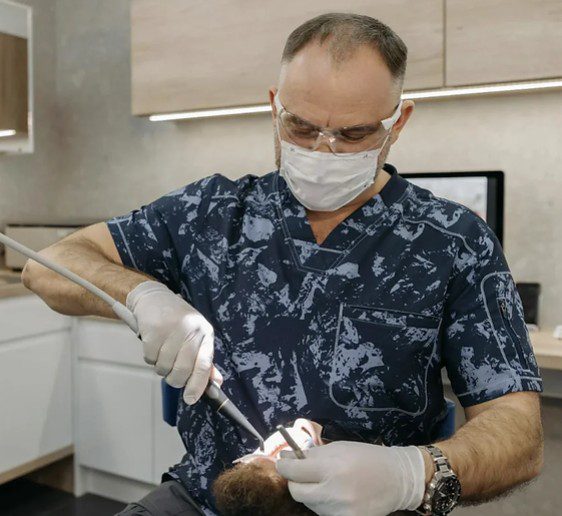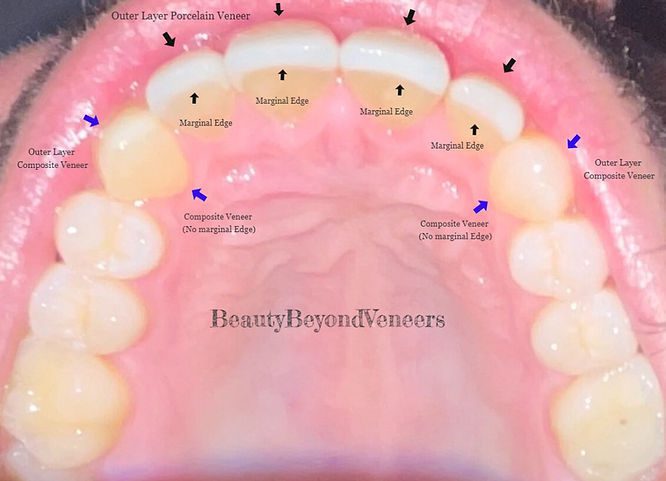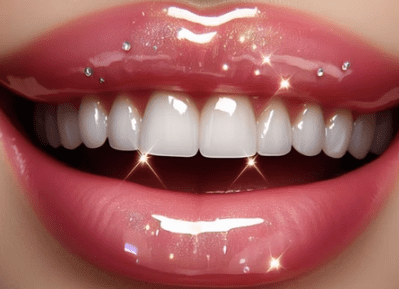Originally published on March 24, 2025. Updated on May 22, 2025.
When Profit and Convenience Win Out: Why Veneers Are Overprescribed
Dentists play a crucial role in advising patients on the best treatments for their oral health.
However, many dentists may be too quick to recommend porcelain veneers over resin composite bonding, even when the latter could be a better, less invasive, and more affordable option.

Here are 6 reasons why some dentists push patients towards porcelain veneers and why, in many cases, this may not be the right choice for you
1. Fixing Small Chips or Wear with Resin Bonding is Often Seen as “Too Much Work”
If you’ve had a small chip on your tooth or resin composite bonding that needed occasional repairs, you might have encountered a dentist who became frustrated with the upkeep.
Resin bonding, while highly effective for small imperfections, can sometimes require touch-ups.
Instead of sticking with it, some dentists will push for porcelain veneers because they view them as a more “permanent” solution, even if you don’t need it.
Why they’re wrong: In most cases, resin bonding is a much less invasive procedure than veneers and can successfully address chips, cracks, or wear. Porcelain veneers require grinding down the healthy tooth structure, which can lead to complications later.

A skilled dentist should take the time to fix minor imperfections with resin bonding rather than pushing for more aggressive treatment like veneers, especially when the issue is minor.
2. Lack of Advanced Training in Resin Bonding for Complex Cases
Resin composite bonding requires advanced skill, particularly when addressing severe cracks or structural damage.
Some dentists may not have the training or confidence to fix more severe issues with bonding, instead opting for porcelain veneers because they perceive it as an easier or “foolproof” option.
They might not want to invest in continuing education to learn the latest resin bonding techniques, even though they exist.
Why they’re wrong: Resin bonding has come a long way, and with proper training, it can be used to fix even severe cracks or damage without the need for veneers.
When a dentist steers you towards veneers because they aren’t comfortable with the complexity of resin bonding, they’re prioritizing convenience over your best interest.
A dentist who is truly dedicated to patient care should be willing to pursue advanced training or refer you to someone who can perform the appropriate bonding technique.

3. Pushing for Porcelain Veneers to Lock You Into a “Subscription Model
Some dentists promote porcelain veneers because they see it as a way to create a long-term dependency.
Veneers need to be replaced every 10 to 15 years, and the initial treatment locks you into a relationship with the dentist, especially if they insist you use their specific lab for custom veneers.
This “subscription model” ensures repeat business, as you’ll need ongoing care to maintain the veneers and may have to replace them multiple times throughout your life.

Why they’re wrong: This approach can feel exploitative because it’s more about generating long-term income than offering the best solution for the patient.
Resin composite bonding can last many years, and touch-ups can be done at a much lower cost.
While veneers may need regular maintenance and replacement, bonding can be adjusted or repaired more easily without locking you into a never-ending cycle of veneer replacements.
4. They Don’t Want to Spend the Time on Composite Bonding
Dentists who prefer veneers may simply not want to take the time to work on resin bonding.
Bonding is a more hands-on, artistic procedure that requires time and attention to detail, whereas veneers are outsourced to a lab, making it less time-consuming for the dentist.
In this case, recommending veneers can be a matter of convenience for the dentist rather than the best option for the patient.
Why they’re wrong: You deserve a dentist who will take the time to offer the best treatment for your needs, not just the one that’s more convenient for them.
While porcelain veneers are crafted in a lab, resin composite bonding is done chairside, allowing for more direct involvement in the treatment process.
A good dentist should be willing to put in the extra effort if resin bonding is a better option for your particular situation.

5. Influence from Celebrity Culture and “Perfect Smile” Trends
Some dentists may recommend veneers based on trends they’ve seen in the media or what celebrities are doing. The allure of the “perfect” white porcelain smile, commonly associated with veneers, may lead them to assume that’s what everyone wants.
However, this doesn’t take into account your individual needs or preferences, and it can push you towards unnecessary cosmetic treatments.
Why they’re wrong: A dentist should prioritize your personal goals for your smile, not what they think is trendy.
Many people prefer a natural-looking smile, which can often be better achieved with resin bonding, especially when it comes to preserving the character and unique appearance of your teeth.
Dentists should have an open dialogue with you about what you really want rather than assuming you’re after a Hollywood-style makeover.

6. Porcelain Veneers Maximize Their Profit
Let’s face it—porcelain veneers are more expensive than resin bonding. Some dentists may push you toward veneers because the higher price tag translates into higher profits for their practice.

In contrast, resin bonding is a lower-cost option that takes more time and effort, but with a smaller financial return.
Why they’re wrong: Pushing for veneers primarily for profit is a disservice to patients.
A dentist should recommend treatments based on your oral health and cosmetic needs, not what’s most lucrative.
Porcelain Veneers may bring in more revenue, but they come at a greater cost to the patient, both financially and in terms of the irreversible changes they require to your natural teeth.
Final Thoughts
It’s important to be aware of the motivations behind a dentist’s recommendation for porcelain veneers. While veneers have their place, they should not be the go-to solution for every case.
Resin composite bonding offers a less invasive, more affordable alternative for many dental issues, from minor chips to more complex repairs.
Before agreeing to porcelain veneers, make sure you understand all of your options, and seek a second opinion if necessary.
A great dentist will prioritize your needs and provide the most appropriate care, not just the most profitable or convenient solution.

Disclaimer: This content is for informational purposes only and does not constitute medical or dental advice. Always consult with a licensed dental professional before making decisions about your oral health.





